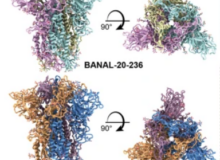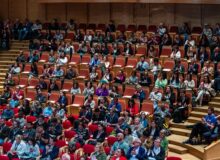by Jonathan Latham, PhD
The gene-editing of DNA inside living cells is considered by many to be the preeminent technological breakthrough of the new millennium. Researchers in medicine and agriculture have rapidly adopted it as a technique for discovering cell and organism functions. But its commercial prospects are much more complicated.More
Feature Articles
EU Threatens To Legalise Human Harm From Pesticides
By Hans Muilerman and Jonathan Latham, PhD
Current EU regulations forbid human exposure to pesticides that are classified as mutagenic, carcinogenic, reprotoxic (toxic for reproduction), persistent or capable of disrupting endocrine systems. By virtue of these and other protective measures EU regulations are considered the gold standard in public protection.
However, experts who are closely linked to industry (or are part of anti-regulation pressure groups) have taken control of the EU’s new Science Advice Mechanism (SAM). These experts have contributed to a report commissioned to reevaluate the EU’s authorisation of pesticides. The report, called “EU authorisation processes of Plant Protection Products”, and published in late 2018, recommends dramatically weakening the EU regulatory system. Especially notable is the adoption of many ideas previously proposed by the chemical industry. More
Rigging the Science of GMO Ecotoxicity
by Jonathan Latham, PhD
Researchers who work on GMO crops are developing special “artificial diet systems”. The stated purpose of these new diets is to standardise the testing of the Cry toxins, often used in GMO crops, for their effects on non-target species. But a paper published last month in the journal Toxins implies a very different interpretation of their purpose. The new diets contain hidden ingredients that can mask Cry toxicity and allow them to pass undetected through toxicity tests on beneficial species like lacewings (Hilbeck et al., 2018). Thus the new diets will benefit GMO crop developers by letting new ones come to market quicker and more reliably. Tests conducted with the new diets are even being used to cast doubt on previous findings of ecotoxicological harm.
The Gates Foundation’s Ceres2030 Plan Pushes Agenda of Agribusiness
by Jonathan Latham, PhD
(This article is reprinted from Truthout.)
Whether the challenge is low-yield crops in Africa or low graduation rates in Los Angeles, we listen and learn,” states the website of the Bill and Melinda Gates Foundation (the Gates Foundation). Even though it is the richest and most powerful organization in all of international aid, the Gates Foundation prides itself on listening to small farmers.
Its critics, however, have often accused the Gates Foundation of not living up to this goal. The importance of listening to farmers might seem straightforward — to avoid the risk of giving people what they don’t need. But underneath, much more is going on.More
EU Reapproval of Glyphosate Leaves Environmentalists’ Strategy in Tatters; What Now?
by Jonathan Latham, PhD
The ecology of Planet Earth is rapidly collapsing under a rising tide of toxic pollution and plastic waste as, in every sector of the economy, natural products and methods are replaced with synthetics. One example, just recently reported, is that in 1974 non-organic wheat production in the UK required 2 sprays per year. In 2014 UK wheat required 20.7 sprays.More
The Biotech Industry Is Taking Over the Regulation of GMOs from the Inside
by Jonathan Latham, PhD
The British non-profit GMWatch recently revealed the agribusiness takeover of Conabia, the National Advisory Committee on Agricultural Biotechnology of Argentina. Conabia is the GMO assessment body of Argentina. According to GMWatch, 26 of 34 its members were either agribusiness company employees or had major conflicts of interest*.
Packing a regulatory agency with conflicted individuals is one way to ensure speedy GMO approvals and Conabia has certainly delivered that. A much more subtle, but ultimately more powerful, way is to bake approval into the structure of the GMO assessment process itself. It is easier than you might think.More
The Meaning of Life (Part I)
by Jonathan Latham, PhD
Many people date the DNA revolution to the discovery of its structure by James Watson and Francis Crick in 1953. But really it began thirty years before, conceived by the Rockefeller Foundation. Thus it is fitting, and no accident, that the chemical composition of DNA was first discovered by the Foundation in the 1920s*.
The Rockefeller Foundation had become interested in DNA because its trustees feared a Bolshevik-style revolution. Intense public resentment had already compelled the break-up of their Standard oil Company in 1911; so the Foundation sought ways, said trustee Harry Pratt Judson in 1913, to “reinforce the police power of the state”. The Foundation intended no less than to obtain the ultimate key to human behaviour which would allow the resentful and envious mobs to be effectively managed.
More
Gene Drives: A Scientific Case for a Complete and Perpetual Ban
by Jonathan Latham, PhD
One of the central issues of our day is how to safely manage the outputs of industrial innovation. Novel products incorporating nanotechnology, biotechnology, rare metals, microwaves, novel chemicals, and more, enter the market on a daily basis. Yet none of these products come with an adequate data set of scientific information. Nor do they come with a clear intellectual framework within which their risks can be placed, as disputes over the precautionary principle show. The majority of products receive no regulatory supervision at all. How will the product be disposed of? What populations and which ecosystems will be exposed in the course of its advertised uses? What will be the consequences of accidental, off-label or illegal uses? Typically, none of these kinds of questions are adequately asked by government regulatory agencies unless citizens actively prod them to do so.More
Genetics Is Giving Way to a New Science of Life
by Jonathan Latham, PhD
Test your understanding of the living world with this simple question. What kind of large biomolecule is found in all living organisms? If your answer is “DNA”, you are incorrect. Many organisms contain no DNA at all.
The mistake is very forgivable though. A standard biology education casts DNA (DeoxyriboNucleic Acid) as the master molecule of life, coordinating and controlling most, if not all, living functions. This master molecule concept is popular. It is plausible. It is taught in every university and high school. But it is wrong. DNA is no master controller, nor is it even at the centre of biology. Instead, science overwhelmingly shows that life is self-organised. The science of biology is thus awaiting the paradigm shift to end all paradigm shifts.More
Cornell Faculty Refuse to Defend GMO Crops
by Jonathan Latham, PhD
Who would have thought that at Cornell University, arguably the most highly regarded agricultural university in the world, no scientist would speak for the benefits and safety of GMOs?
Perhaps I should have known, however. Last year I was invited to debate the merits of GMOs at Colby College in Maine. Also invited were food activist Jodi Koberinski, Stephen Moose (University of Illinois), and Mark Lynas of the Cornell Alliance for Science and prominent advocate of GMOs worldwide. Soon after Lynas heard I was coming, however, he pulled out of the debate.More



